The Best Anime Movies You Can Stream On Netflix Right Now
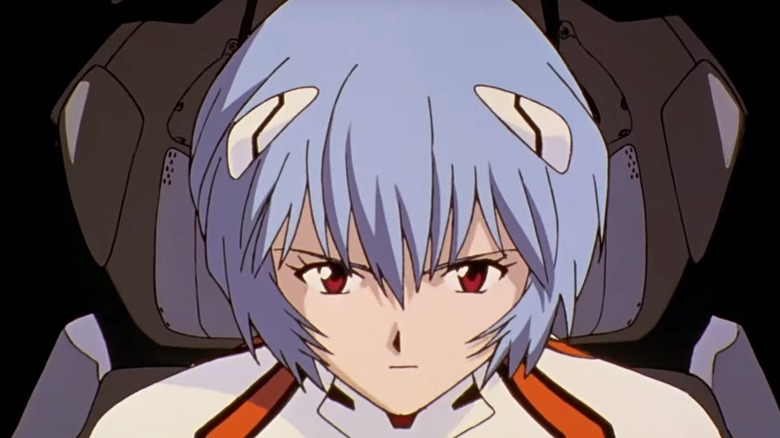
Japanese animation, also known as anime, is a lot of things -- but "only for children" is not one of them. Any fans of anime TV series and movies will be able to tell you that anime spans all genres: romantic comedies to fantastic tales, sci-fi epics to philosophical narratives. It's all animated, but it's not necessarily for kids. Anime can be as goofy and family-friendly as the newest Pixar flick, or as deep, mature, and stylish as the latest indie darling. It's a medium, not a genre. It can do anything.
For a few years now, Netflix has expanded their catalog to include more anime, both series and movies, and have even started producing some films and shows of their own. Whether you were introduced to anime via epic series that lasted for hundreds of episodes or by watching smaller, indie productions, you're sure to find an anime film on the service that caters to your unique preferences. Here are the best anime movies you can watch on Netflix right now.
Flavors Of Youth
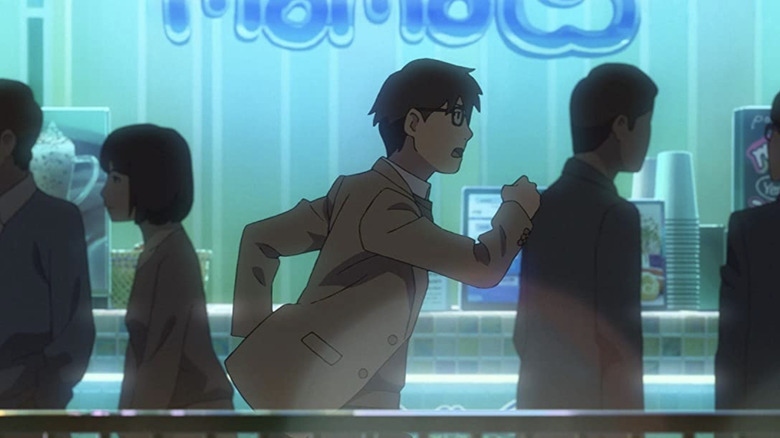
A co-production between Japan and China, "Flavors of Youth" (2018) is a hybrid of Japanese and Chinese animation. The drama anthology film follows three different storylines, which are respectively titled "The Rice Noodles," "A Little Fashion Show," and "Love in Shanghai," all of which are set in China. As the title suggests, "Flavors of Youth" focuses on the characters' youth: while every episode is helmed by a different director, the three installments all see characters lingering on memories and the passage of time.
The first episode, "The Rice Noodles," is a visually stunning short about the power of food and taste to trigger memories. The main character, Xiaoming, is transported back to certain moments in his life as he eats San Xian noodles, which he used to enjoy with his grandma. The superposition of an idealized past, the noodles (which might be one of the most appetizing foods depicted in anime), and Xiaoming's grey present is startling and drives that episode's story.
The second episode, "A Little Fashion Show," centers on the struggle of an aging model named Yi Lin as she tries to find her place in a fast-paced industry focused on youth and beauty while also taking care of her little sister. The third episode, "Love in Shanghai," depicts the regrets of Li Mo, a recent graduate who discovers an old cassette tape from his childhood and goes back home to listen to it. While the three stories aren't connected, they all explore similar themes, and the mix of animation styles makes for a visually diverse experience.
Lu Over The Wall
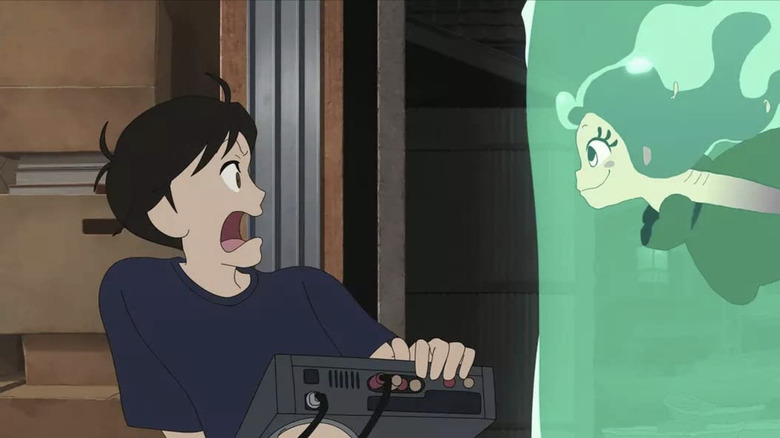
A Japanese folklore take on "The Little Mermaid," "Lu Over the Wall" (2018) is a family-friendly, coming-of-age tale following middle-school student Kai Ashimoto who has a love for music and overbearing parents. During a trip to Merfolk Island, Kai meets the mermaid Lu, who is able to transform her fish fins into legs and also happens to love music, as well as dancing. Kai introduces her to his band, SEIREN, which consists of him and two of his friends, Kunio and Yūho. Videos of Lu end up going viral, exposing the merfolk to the world. There's a history of hostility between the merfolk and the village inhabitants, and Lu's existence quickly becomes a problem.
The merfolk are not what you'd expect: They have weird, vampire-like attributes, such as being able to transform humans into merfolk by biting them. They are also vulnerable to the sun, and when exposed, burst into flames. The film is light-hearted, with many dance sequences and a colorful, graphic animation style that is director Masaaki Yuasa's signature. The messages in "Lu Over the Wall" feel a bit forced, but the dance sequences are where the film really shines.
A Silent Voice
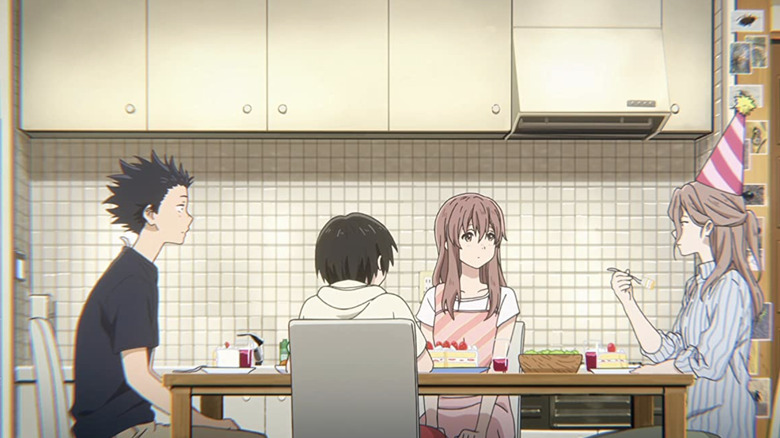
"A Silent Voice" (2016), based on a manga of the same name, is a heart-wrenching drama about bullying and redemption. The story follows Shoya Ishida, a high school student who plans on committing suicide, but decides against it at the last minute. Instead, he chooses to seek forgiveness and redemption. Years prior, Shoya bullied a deaf transfer student, Shoko Nishymiya, which led to a physical altercation between the two, and another transfer for Shoko. After being identified as Shoko's bully by the school principal, Shoya was in turn bullied by his other classmates. Around the same time, he found and held onto a notebook which used to belong to Shoko; she used it to communicate with people who didn't speak sign language.
Shoya resolves to tie up this loose end and heads to the sign language center to apologize, but he falters at the last second and instead asks Shoko to become friends. Not only is this a story about how Shoya seeks redemption, but it is also a story about self-love and acceptance. Shoya needs to forgive himself, while Shoko learns to accept her disability. The movie's visuals are as beautiful as its morals are deep and moving, with rich backgrounds and thoughtful character design. Combined with strong editing and music, "A Silent Voice" is one of the best anime movies to come out in recent years.
A Whisker Away
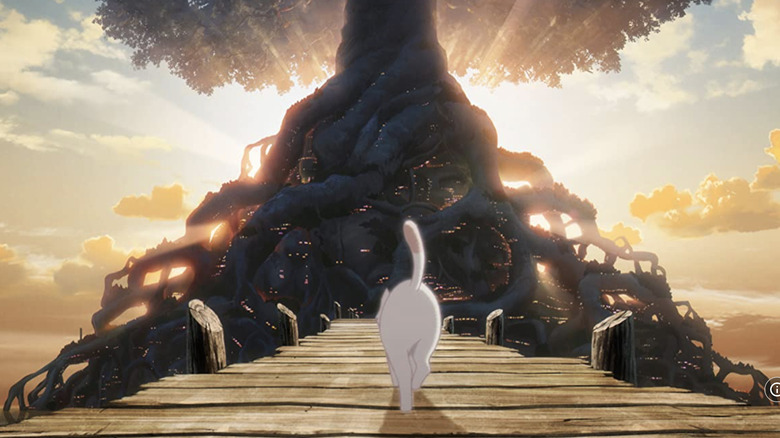
Ever wish you could turn into your favorite animal and flee from your life's troubles? "A Whisker Away" explores this very idea through Miyo, a teenage girl who can transform into a cat. Miyo is known to her classmates as Muge, short for "Miss Ultra Gaga and Enigmatic"; she's head-over-heels in love with a boy in her class, named Kento, and is not very good at hiding her crush. However, Miyo's home life is not rosy; her parents are divorced, and her mom keeps bugging Miyo about her dad's new wife. Miyo gains the ability to become a cat after acquiring a mask from a street merchant who appears out of thin air when she wishes her life could be different.
Miyo visits Kento in her cat form, and he becomes fond of her and names her Tarō. At first, Miyo turns into Tarō whenever she's faced with a problem, but eventually, she loses her human face, and risks becoming a cat for the rest of her life. There are consequences to all of our life choices, and Miyo's decision to not face people and events makes her risk losing herself. The animation of Miyo in her cat form is especially detailed and sharp, and while the subject matter takes on a serious tone, the film's bright and soft images keep "A Whisker Away" light and fun for all audiences.
Ni No Kuni
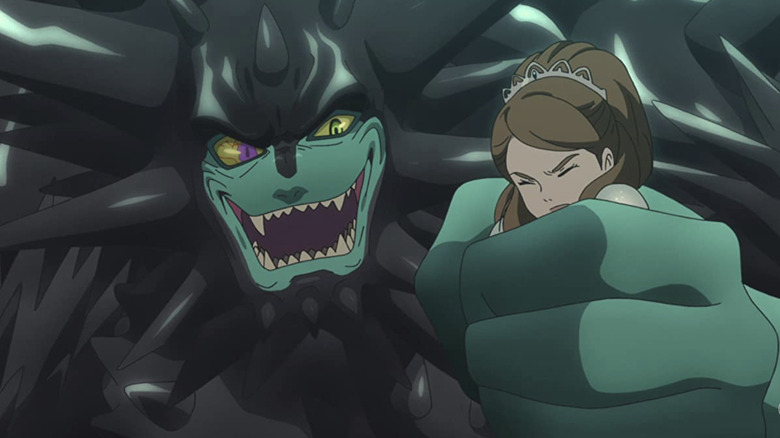
If you feel like you've heard that title before, it's because you have: "Ni no Kuni" began as a series of video games, the first one of which had animated sequences produced by the acclaimed Studio Ghibli. The official movie adaptation, which came out in 2019, wasn't produced by Ghibli Studio, but it does match the studio's signature animation style.
"Ni no Kuni" means "second country" in Japanese; the film explores a fantasy world in parallel to ours, through the story of Yuu and Haru, childhood friends who have a crush on the same girl, Kotona. As Yuu and Haru rush to save Kotona's life after she is stabbed in the street, they are caught in a car accident and transported to a fantastic world. As they navigate the kingdom, which is full of wars and magic, they discover that the kingdom's princess, who closely resembles their crush Kotona, is afflicted with a deadly curse and needs their help. The movie switches between both worlds, as Yuu and Haru struggle to come to terms with what's going on in the real world, then fall back into the fantasy to process their emotions.
Neon Genesis Evangelion: The End Of Evangelion
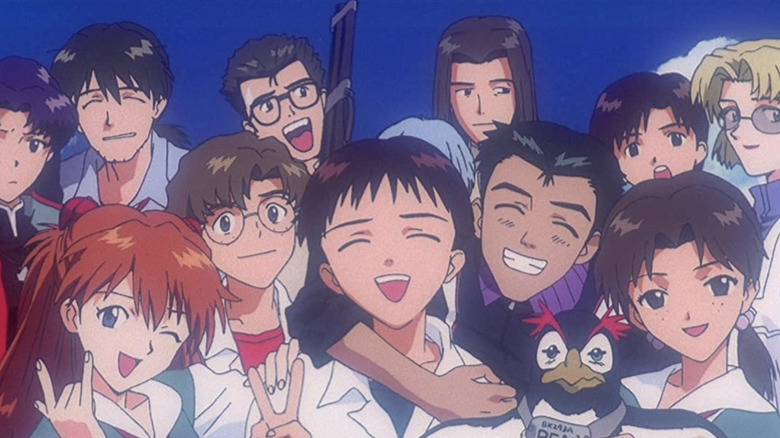
If you're an anime fiend, chances are that you watched, or at least heard about, the classic sci-fi anime series "Neon Genesis Evangelion," which came out in 1995 and 1996. The 1997 movie "Neon Genesis Evangelion: The End of Evangelion" picks up right where the series left off, offering an alternate ending to the beloved show.
The series is set in the city of Tokyo-3, 15 years after aliens known as "Angels" first attacked the city. Angels are gigantic extraterrestrial lifeforms that humans combat with the help of NERV, an organization that has built some colossal mechs known as Evangelion, or EVA. The EVA units are piloted by teenagers: The main character in the show is Shinji Ikaru, estranged son of NERV commander Gendo Ikari, and pilot of Evangelion Unit 01. He's accompanied by teenage girls Rei Ayanami, who pilots Unit 00, and Asuka Langley Sōryu, who pilots Unit 02. Both the show and movie explore themes surrounding frustration, sexual angst, and coming of age, as well as philosophical concepts like transhumanism and individuality.
"Neon Genesis Evangelion: The End of Evangelion" is not a standalone movie by any means, so watching the series first (or reading up on it) is necessary before diving into this parallel ending. The strongest point of the movie is without a doubt the visuals, which were strong for the time and have aged well. The mech fights are beautifully choreographed, and director Hideaki Anno plays with some striking experimental animation in the second half of the movie.
Mirai
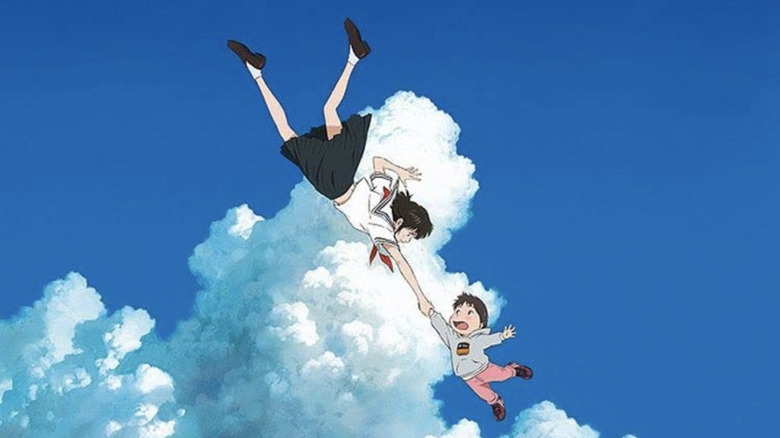
A childhood tale not only meant for children, "Mirai" (2018) explores sibling envy, or how an older child can feel neglected when they get a new younger sibling. Such is the predicament of 4-year-old Kun when his sister Mirai is born. In response to Mirai's arrival, young Kun throws temper tantrums, much to his parents' dismay. However, after each tantrum, he has weird, fantastical encounters, first with beloved dog Yukko, who suddenly assumes a human form, and then with teenage Mirai, who's traveled back in time. Each encounter teaches Kun something new, helping him adjust to his new reality as an older brother. Whether these sequences are real or imagined is not clearly explained, and in the end, doesn't really matter.
"Mirai" is a great movie to watch as a family, but even for adults, it's a charming tale. The film's background, which were hand-painted in oil, give it a magical, other-worldly quality, and the way Kun moves with his oversized head is adorably funny. "Mirai" takes an almost-universal story about older and younger siblings and the way family dynamics shift when a newborn arrives and makes it into an enjoyable, simple childhood movie.
Berserk: The Golden Age Arc
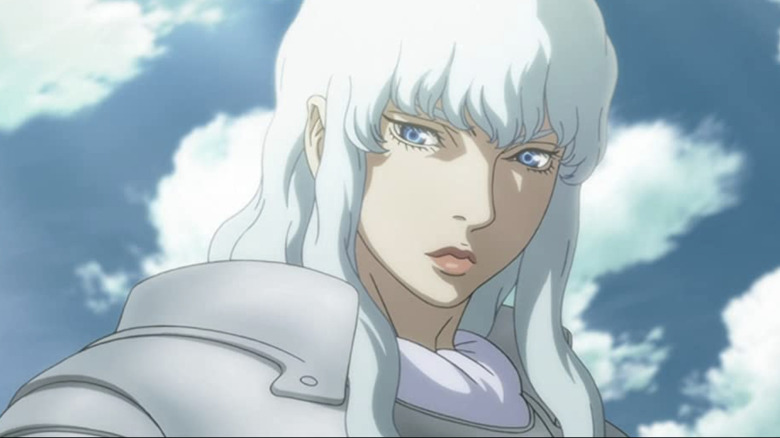
Another anime-TV-show-turned-movie series, "Berserk: The Golden Age Arc" is a trilogy which was adapted from the manga of the same name -- more precisely, the manga's "Golden Age" arc. The TV show, which aired back in 1997, consisted of 20 episodes, and while the movies explore some of the same stories as the show, the movie trilogy starts from the very beginning. All three "Berserk: The Golden Age Arc" movies are currently on Netflix, making it easy to binge-watch the trilogy right away.
The story of "Berserk: The Golden Age Arc" focuses on a mercenary called Guts, who is forced to join the Band of the Hawks after being defeated in a duel with the group's leader, Griffith. Guts becomes friends with Griffith, as well as another member named Cona, and the first movie explores their relationship with each other, playing up themes like loyalty and betrayal. The "Berserk" movies are known for being extremely violent and gory, as well as containing sexually explicit themes and images. The CGI animation can be lacking, too. Nevertheless, the "Berserk" trilogy is very entertaining, and should thrill both newcomers and fans of the original material.
No Game No Life
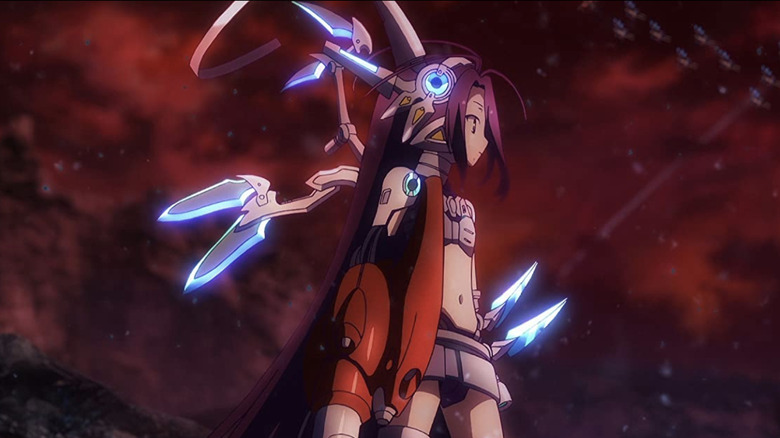
Like other movies from this list, "No Game No Life" has lived through many permutations: a manga, a series, and a movie. However, "No Game No Life: Zero," released in 2017, is meant as a prequel to the TV show, and thus doesn't require any previous knowledge of the franchise.
Set in Disboard, a utopian world in which playing board games is how you survive, "No Game No Life: Zero" begins during a game of chess between Izuna and Tet, characters from the original show. Tet starts telling Izuna the story of how this world came to be 6,000 years earlier. During the time of the Great War, a war caused by the gods that pitted all races against each other, two people -- Riku, the leader of humanity's last colony, and Shuvi, a cybernetic life-form -- decide to cooperate to save the world, hatching a plan that would make Riku the one true god.
This sci-fi epic is full of complicated lore, which can turn out to be immensely satisfying if you're into that sort of thing. The tense relationship between enemies-turned-friends Riku and Shuvi lets the film explore themes of difference, conflict, and friendship, and the rhythm of the film makes up for the show's slower pace.
Violet Evergarden: Eternity And The Auto Memory Doll
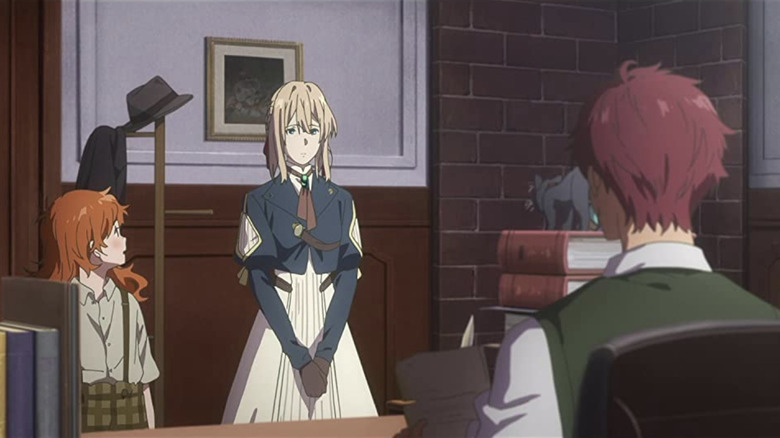
Based on a series of manga named "Violet Evergarden" and a TV adaptation of the same name, "Violet Evergarden: Eternity and the Auto Memory Doll" is the first movie to come out of the franchise in 2019. It follows the titular character, Violet Evergarden, in her work as an Auto Memory Doll, which is a very fancy way to describe a ghostwriter. The film plays out in two parts. In the first half, Violet assists Isabella York, a young lady related to the royal family who needs help learning manners. Violet helps Isabelle write a letter to her estranged younger sister, Taylor. In the second half of the movie, Taylor tracks Violet down and becomes a postman at the place where Violet works.
The post-Edwardian style used in the characters' designs is stunning and makes for a unique anime. The movie is meant as an introduction into the franchise's world, while the second movie "Violet Evergarden: The Movie," which came out in 2020, is a more complete offering. Nevertheless, "Eternity and the Auto Memory Doll" is an excellent film that is sure to make you want more.
Read this next: The Best Anime Of The Decade
The post The best anime movies you can stream on Netflix right now appeared first on /Film.
from /Film https://ift.tt/2YaTGxv
No comments: